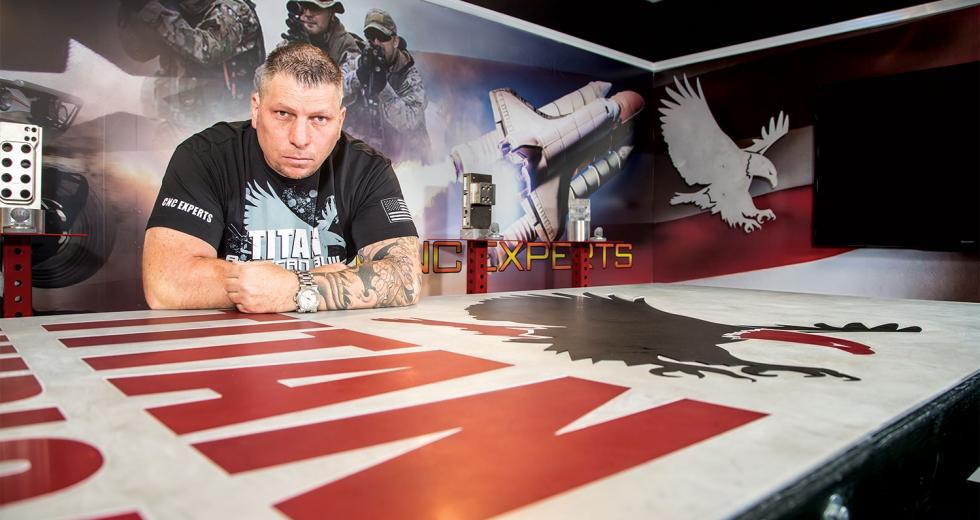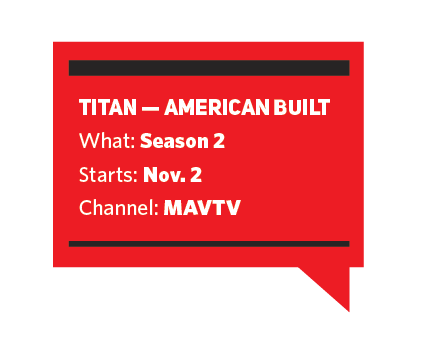When Zinola Manufacturing owner Kevin Zinola took a chance and offered convicted felon Titan Gilroy an entry-level job in his small Sunnyvale machine shop, he had no idea where the relationship would go. In the years to follow, Gilroy reformed his life, worked his way up through several companies and finally, established Titan America Manufacturing. Today, the Rocklin-based company has 30 employees, boasts several million dollars in annual revenue and has made a devout commitment to source from American companies. Gilroy’s also on a mission to change the way business leaders think about offshore outsourcing.
While business outsourcing is a common practice where companies look to other domestic experts to handle a portion of their work (such as payroll or personnel services), offshore outsourcing is very different. That’s when an organization pays to have its work done in another country. An outspoken proponent of keeping American manufacturing at home, Gilroy believes the only reason companies continue to offshore their labor is because they don’t know any better. “The sophistication of technology, automation and the machines we work with today allow us to produce top-quality products much faster than the competition, saving us money and making offshore outsourcing a thing of the past.”
Success did not come easy for Gilroy. Raised by a single mom who fled an abusive husband, Gilroy turned to boxing to defend himself from bullies. His dedication to the sport led to an amateur boxing career and a checkered police record. He seriously injured two men in a nightclub brawl and served three years in prison. After he was released, Gilroy attempted to return to boxing, but the violent nature of the sport nearly landed him in jail again. He quit for good and moved from Las Vegas to Northern California, looking for a new path — which he found in a job with Zinola Manufacturing running CNC machines.
When Gilroy originally launched his company, he worked around the clock, sleeping on a sofa bed at the shop so he could meet deadlines. In his first year of business, he made $1 million in revenue. This year he hopes to make ten times that amount.
“Titan was sincere in his desire to work and to learn our business,” Zinola says. “He worked hard and learned quickly, so we gave him more responsibility as he gained experience.”
Gilroy worked overtime to learn the trade and took classes at the National Tooling and Machining Association. Within a year, he was the head programmer and shop foreman. “Mr. Zinola gave me a chance with a $9-an-hour, entry-level job, and I used the opportunity as the first step in a new career,” Gilroy says.
That new career took off when Gilroy founded Titan America Manufacturing in 2005. The company produces a plethora of intricately machined parts from an assortment of extreme alloys and metals, including titanium, carbon fiber and inconel, all purchased from American suppliers. His clients run the gamut from top aerospace companies and the military to the only private rocket company to reach orbit.
When Gilroy originally launched his company, he worked around the clock, sleeping on a sofa bed at the shop so he could meet deadlines. In his first year of business, he made $1 million in revenue. This year he hopes to make ten times that amount.
Gilroy’s aim is always to source materials domestically. He works with about 15 different American companies, many in California, and has learned over the years that not all products are created equal. For example, when internationally sourcing metals like steel and aluminum, the materials are not regulated like their domestic counterparts, so the products are of lower quality and don’t perform well. “I could pay less for foreign materials up front, but in the end, I lose because the products are harder on my tools and don’t run fast enough,” he says. “It can take up to 30 percent longer to machine poor-quality materials.”
Anything that impedes Gilroy’s efficiency impacts his bottom line. “We are very efficient with our machines and our processes,” he says. “We make very few mistakes and have figured out how to run parts nonstop while maintaining quality.”
Gilroy believes efficiency and consistency are keys to profitability, along with client trust and staying on top of market trends. “To really find cost-saving efficiencies, you have to dig deeper into the tools of manufacturing,” he says. “But most businesses are content to accept the minimum capacity because they are getting the job done. They don’t expect more, so they don’t look for more.”
Because Gilroy works with clients in precise industries such as aerospace and aviation, there is no room for error. Each material he deals with has a certification which breaks down the different properties and processes, and ensures they are fully traceable. “This is a very serious business, and I’ve learned that you can’t cut corners,” he says. “You have to follow the process in manufacturing and then perfect it.” Because of the lack of regulation with foreign suppliers, Gilroy trusts his American suppliers more than international ones.
Related: Made in America
He also believes manufacturing is all about relationships and solving problems, and that he has learned the art of both. “When I am sourcing a product or machine, I make sure the supplier knows my story and what I am trying to accomplish,” he says. “Instead of them trying to kill it on a couple of jobs, I let them know I will give them all my business if they work with me on price. It’s a win-win for both of us.”
According to the Alliance for American Manufacturing, a nonprofit partnership formed to strengthen American manufacturing, the U.S. is a cost-competitive manufacturing location for 90 to 95 percent of products. Some products, like apparel and footwear, low-cost toys and a number of consumer electronics, are difficult to produce cost-effectively in the U.S. market. But manufacturing, the high-tech sector and energy opportunities are increasingly gaining traction in America.
“There’s a good case to be made for the advantages of doing business in America,” says Alliance for American Manufacturing President Scott Paul, “including lower energy costs than Europe and Asia, the ability to control incentives, lower shipping costs, being closer to the customer base and having access to a highly skilled workforce, just to name a few.”
AAM has advised Gilroy and other businesses on what it takes to run an American-sourced business successfully. “Their knowledge-base is extensive, so I tap into that whenever I can,” he says.
Gilroy is also a proponent of reshoring, or the practice of bringing manufacturing and services back to the U.S. from overseas. Championed by successful American businessman Harry Moser, the Reshoring Initiative was founded in 2010 to help companies more accurately assess the total cost of offshoring and shift the collective thinking from “offshoring is cheaper,” to “producing local reduces the total cost of ownership.”
With more than 45 years of manufacturing experience, Moser is a leading industry spokesman for reshoring and provides the tools and information to implement it. Through Moser’s site, reshorenow.org, businesses have access to a number of resources, including a free online tool that helps companies account for all the relevant factors that impact sourcing decisions.
“Most companies make sourcing decisions based solely on price, which often results in a 20- to 30-percent miscalculation of the actual offshoring cost,” Moser says. Some costs that are often overlooked include duty, freight, packaging, intellectual property risk, and the distance, time and language barriers of manufacturing overseas. “Once companies truly evaluate the total costs associated with offshoring their business, they often find they can do it for the same price or cheaper in their own backyard.”
That is the message Gilroy is trying to promote. His passion for the viability of American manufacturing has led him to launch his own cable television show, appropriately named “TITAN-American Built.” The show is filmed live on the factory floor, giving viewers a taste of what a working American manufacturing shop looks like. Last season, Gilroy visited Oxnard, Calif.-based Haas Automation: a classic, garage-startup that developed the first-ever fully automatic, programmable collet indexer — a high-accuracy device used to position parts for machining. That was followed by the successful launch of the VF-1 machine, which performs milling, drilling, tapping and boring and costs less than $50,000 — roughly one-third the cost of its Japanese counterpart. Now, Haas machines are sold all over the world, including in China and at Gilroy’s facility in Rocklin. Last year, the company brought in $1.2 billion in revenue.
“We take the time to pull back the curtain and let the audience see how it’s done,” says Gilroy. “I also ask tough questions like ‘How do you compete in America?’, ‘How do you get your materials?’ and ‘How do you price them?’.”
Season two, airing this fall, will highlight Torrance, Calif.-based Edelbrock, a well-known manufacturer of high-performance automotive and motorcycle parts that has been in business since 1938. Gilroy and company are also taking the show on the road with stops in Detroit, Mich., Los Angeles, Calif. and Madison, Wis., where the program will highlight a successful American manufacturing story in each city.
The factors that once tipped the scales in favor of offshore outsourcing are slowly being dismantled in support of working with domestic suppliers, and Gilroy is committed to helping business leaders see that. With his burly chest and tattooed arms, Gilroy cuts an imposing figure. But when he speaks, people listen. In addition to his reality show, Gilroy is a frequent guest speaker around the country on the topic of overcoming obstacles and launching a successful American business.
“I am an example of how business can be done in America,” he says. “I tell people that Titan America Manufacturing is my company, but America is my brand.”





Comments
When I saw the cover page I thought: "Looks like he just got out of the penitentiary" He was a worthwhile risk to let back into society. Although the men he beat the hell out of might disagree. But they let him back. He was insightful in finding a niche, and had a feel for this type of manufacturing. Firmly believe that manufacturing in the U.S. and bringing good paying manufacturing jobs back is necessary to build the middle class here again. Good story.
Thanks for mentioning the Reshoring Initiative!
The Reshoring Initiative Can Help.
The not-for-profit Reshoring Initiative’s free Total Cost of Ownership software helps corporations calculate the real P&L impact of reshoring or offshoring. In many cases, companies find that, although the production cost is lower offshore, the total cost is higher, making it a good economic decision to reshore manufacturing back to the U.S. http://www.reshorenow.org/tco-...
The Reshoring Initiative not only provides tools and information to help manufacturers make sourcing decisions, but also programs to help economic development organizations, manufacturing extension partnerships, universities, community colleges and other organizations bring back offshored work in their region and develop a stronger skilled workforce. Our programs can be found here: http://www.reshorenow.org/prog...
Chicago Society of Manufacturing Engineer #5 will feature Harry Moser at our meeting at the Digital Manufacturing and Design and Innovation Institute (DMDII) meeting to be held Nov 2 on Goose Island on Chicago's North side.
It also feels great to sell a machine tool that's Made in the USA, Wellsaw/WF Wells horizontal saws built in Kalamazoo and Three Rivers, MI. I'd go there to do some filming.
Keep the Faith Big Guy. I'm with you.